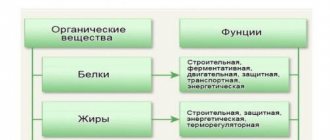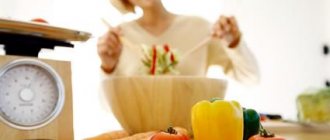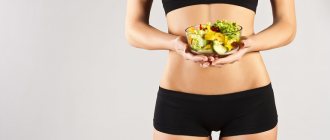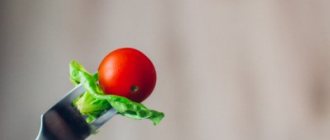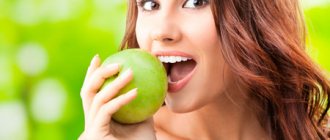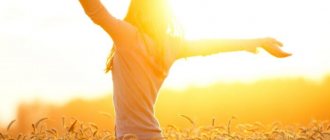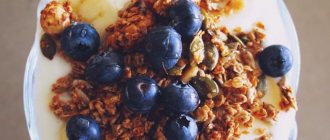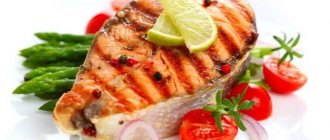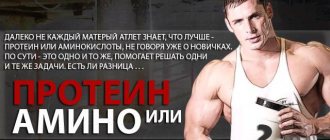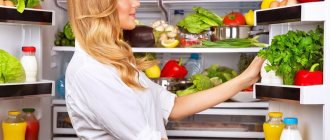Most often, newcomers to the world of sports quit training because they chose the wrong diet. If their diet is insufficient in calories, they feel exhausted and cannot quickly recover after exercise. When you overeat, you have the strength for full training, but your weight continues to increase. Then they get disappointed and give up trying to get their body in order.
To achieve the desired results in sports, you need to correctly create a menu. The body should not suffer from nutritional deficiencies, because the athlete must have enough strength to carry out an effective workout. However, it is not recommended to exceed the number of calories in the daily diet, because then the percentage of fat tissue will continue to increase. To lose weight or stay in shape, you need to know how to eat properly before, during and after exercise.
The importance of proper diet during intense training
Nutrition during fitness is not a strict diet, but a complete, varied menu. The basis of an athlete’s diet is proteins and carbohydrates. For proper functioning of the body, you should consume vegetable fats.
Products high in protein must be in an athlete’s diet. These substances stimulate metabolic processes and are involved in muscle building. With a lack of protein, muscles cannot grow and strengthen. Protein food is necessary, even if a person wants to lose weight, it speeds up metabolism and the fat burning process.
Complex carbohydrates are necessary to restore energy reserves. With a lack of these nutrients, the athlete feels constant fatigue and exhaustion. Then the effectiveness of the training decreases, which negatively affects sports results.
Important! If your goal is to lose weight, then you need to limit the amount of simple carbohydrates as much as possible. They can be consumed in minimal quantities after training.
When playing sports, it is recommended to reduce the amount of foods rich in animal fats. It is better to replace them with substances of plant origin. You shouldn’t completely give up fats, as they are necessary for the normal functioning of many body systems. In addition, these nutrients in minimal quantities promote fat burning.
It is also necessary to maintain a drinking regime during training. Plain water stimulates the intestines, promotes the absorption of nutrients, improves the motility of the digestive organs, and accelerates the elimination of toxic substances.
This is interesting! To speed up metabolic processes, improve the functioning of the gastrointestinal tract, and stimulate fat burning, you need to consume water and fiber.
Be sure to check out:
Fitness for the abs at home and in the gym Fitness for beginners: competent workouts for a toned figure and healthy body Fitness at home: a sporty and toned figure Effective fitness workouts for losing weight
The role of proteins, fats, carbohydrates
The role of proteins, fats and carbohydrates for the body is very important.
Proper nutrition when doing fitness for weight loss should include the right amount of proteins, carbohydrates and fats. What is each of these elements needed for?
- Squirrels. This element performs a construction function - it forms muscles and also helps them recover after physical activity. You need to consume about 1 gram of protein per 1 kilogram of weight per day with moderate exercise and up to 2 grams with intense training.
- Fats. Give energy, maintain the beauty and health of nails and hair. On average, you should consume 40-60 grams of healthy fats daily.
- Carbohydrates. They supply much-needed energy to the body. They are divided into simple (sweets, fruits) and complex (pasta, cereals). Preference should be given, first of all, to complex carbohydrates. The daily norm is about 100 grams.
HELP: You can download a special application to your phone that will help you calculate your KBJU norm and in which you can record the food you consume. This is a great motivator - you can clearly see how much and what elements you received, and what the calorie content of your diet is.
How to eat to lose weight effectively
Proper nutrition when playing sports requires following these recommendations:
- Do not go on strict diets, this is fraught with exhaustion of the body and a decrease in athletic achievements.
- Create a calorie deficit; the menu needs to be reduced by 500 kcal or spent during training.
- If you want to increase muscle mass, then supplement your diet with proteins.
- Eat at least 5 times a day with an interval of 3 hours, but in portions not exceeding 280 g.
- Don't skip breakfast, because the first meal is the most important. Higher calorie foods should be consumed in the first half of the day; dinner should be light.
- Replenish your menu with lean proteins, complex carbohydrates, and vegetable fats.
- Eliminate fatty, fried, spicy, salty foods, processed foods, fast food, confectionery, etc. from your diet.
- Avoid alcohol, soda, and tonic drinks (coffee, strong tea, cocoa).
- Drink 2 liters of water in small portions throughout the day.
- Limit the amount of sugar.
Important! You can supplement proper nutrition with vitamin and mineral complexes.
It is very important for an athlete to know how to eat before, during and after training.
Before training
About 2 hours before exercise you need to consume proteins. An athlete can prepare a protein drink. Meals should be light and contain a minimum amount of calories:
- Oatmeal based on milk and water (1:1), egg white omelette.
- Boiled brown rice, a piece of lean meat, a slice of bran bread.
- Steamed fish, boiled potatoes.
A full meal should occur no later than 2 hours before the training. If you can’t eat a full meal, then half an hour before class you can snack on fruits or berries with a low glycemic index, for example, an apple or strawberry, or low-fat dairy products.
During class
Of course, you shouldn’t eat during training, but you need to drink water. The athlete can drink liquid whenever he feels thirsty.
Carefully! If you experience dry mouth, severe fatigue, or dizziness, immediately stop training, drink water and rest. This is how dehydration manifests itself.
Before class, drink 220 ml of still mineral water. When training, drink liquid in small sips at intervals of 15 minutes. In addition to water, you can consume fresh juices made from fresh fruits or berries. But if you are overweight, it is better to stick to regular or mineral water.
If the class lasts longer than 60 minutes, then prepare a protein shake.
After the training
After the gym, the athlete should eat protein and carbohydrate foods no later than 2 hours later. They will help compensate for wasted energy, relieve hunger, speed up metabolism, fat burning, recovery and muscle growth.
The following dishes will help compensate for protein concentration after training:
- Boiled lean meat.
- Omelet without yolks.
- Steamed fish.
- Low-fat sour milk.
The best sources of complex carbohydrates are natural cranberry or grape juice.
Important! It is forbidden to consume fats within 2 hours after training.
Best Products
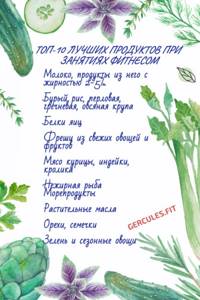
Nutritionists and fitness experts advise supplementing your diet with the following foods:
- Milk and milk products with a fat content of 2-5%.
- Brown rice, pearl barley, buckwheat, oatmeal.
- Egg whites.
- Fresh juices from fresh vegetables and fruits.
- Meat of chicken, turkey, rabbit, etc.
- Lean fish.
- Seafood.
- Vegetable oils.
- Nuts, seeds (small amount).
- Greenery.
- Seasonal vegetables, fruits.
Whole grain bread and grade A pasta are valuable sources of complex carbohydrates.
Forbidden food
To speed up fat burning and increase muscle mass, the athlete needs to give up the following foods:
- Fatty duck, pork, goose, lamb.
- Halibut, sturgeon, sardines and other very fatty fish.
- Semi-finished products, fast food.
- Canned food, marinades, pickles, smoked meats.
- Pastries, cream products, ice cream, etc.
- Store-bought sauces.
- Millet flour products.
- Snack products (chips, crackers).
- Fat milk and products made from it (more than 6%).
Also, athletes are strictly not recommended to drink alcohol.
Menu option for the day
When doing fitness, an athlete can eat as follows:
- Breakfast – omelet without yolks or stewed vegetables, whole grain toast with nut butter, green tea.
- Lunch – soup in vegetable broth with cereal, buckwheat in water, a piece of boiled meat, compote.
- 2 hours before training – cottage cheese with dried fruits.
- After classes - vegetable stew.
- Dinner – a glass of natural yogurt, biscuits.
The menu should be varied, the main thing is to use products from the list of permitted ones.
Examples of menus for fitness classes
To maintain the right balance between fitness and nutrition, you need to choose healthy foods that fill you up, replenish the loss of vitamins and nutrients, but do not make you feel heavy. To make it easier to navigate, we will give examples of universal dishes for those involved in fitness.
For breakfast while on a diet, omelettes with stewed vegetables, whole grain toast, nuts or nut butter are recommended. You can stick to oatmeal or similar porridge, boiled brown rice with chicken breast, or lean steak. For lunch you should choose soups in light broths with cereals, meat, fish with a vegetable side dish, dairy products, including cheese. Complex carbohydrate cereals, low-fat cottage cheese, poultry, seafood, decoctions of berries and rose hips are suitable for dinner.
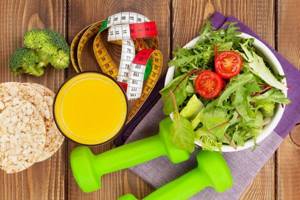
The diet should consist of:
- lean meat - chicken, veal, turkey;
- fish rich in Omega-3 acids and seafood, which are high in protein and microelements;
- eggs – to lose weight, eat only protein;
- green vegetables - spinach, cucumbers, cabbage, celery (but be careful with avocados, they are healthy, but high in calories);
- seasonal fruits and berries with a low glycemic index - apples, strawberries, etc.;
- vegetable oils, nuts and seeds (in small quantities);
- low-fat fermented milk products, milk 2-5% fat;
- bran bread, whole grain pasta, unprocessed cereals;
- greenery.
To get the maximum benefit from fitness, you need to be careful about food, its composition and quality. But what to do if you have no time or desire to cook? The BeFit service will help you balance fitness and nutrition without unnecessary hassle. Specially developed ready-to-eat meal delivery programs are convenient for everyone who watches their form. Neatly packaged containers, convenient to take with you, KBZHU in products is precisely selected for a specific purpose. The programs will help you gain muscle mass, lose weight, or maintain an optimal regime during active sports. Choose your delicious, varied menu and always be in shape with BeFit.
Diet options for emergency weight loss with exercise
Let's find out how to eat to lose weight quickly. There are many diet options, but they can be dangerous to your health, so it is important to carefully monitor your well-being.
Emergency diet options:
| Diet name | The essence | Result |
| Cucumber | The basis of the diet is cucumbers. In addition to this vegetable, you can eat low-fat fermented milk products, fruits, berries, and other vegetables. An athlete can eat stewed cabbage with cucumber salad, drink a vegetable smoothie, and have 1 fresh cucumber and an apple for dinner. | In 3 weeks you can reduce weight by 5-15 kg |
| Kefir | You can only consume kefir, preferably no more than 2.5% fat content. | From 5 to 10 kg in 10 days |
| Citrus | It is allowed to eat grapefruits, oranges, pomelo, etc. They can be eaten fresh, made into juices or salads. | Up to 7 kg per week |
| Dairy | The basis of the diet is skim milk. It is also allowed to eat natural yoghurts, kefir, cottage cheese (with zero fat content). | Up to 2 kg per week |
| Vegetable | Eat only vegetables 5 times a day, a portion of food does not exceed 280 g. Foods can be boiled, steamed, baked (without oil) or eaten raw. There are a lot of vegetables, so the diet is quite varied. | Up to 10 kg per month |
| Emergency | In the first week, drink only low-fat kefir, the next 5 days - fresh vegetables or berries, then a one-day hunger strike follows. The remaining 5 days are allowed to consume vegetable or meat (low-fat meat) broths. Requires a gradual return to the regular menu. | Up to 15 kg |
Carefully! You cannot follow a citrus diet for more than a week, as there is a risk of damage to the mucous membrane of the digestive organs.
There is another option for a strict hunger strike, during which a person eats light plant foods for 1 day, and on the second day drinks only water. The fast lasts 2 weeks and allows you to lose about 15 kg.
It is important to properly combine nutrition and exercise. If the diet is very strict, then the athlete should perform simple, low-impact exercises. With a varied diet (for example, a vegetable diet), the intensity of the training can be increased.
Before following a diet, you should consult your doctor, as many of them are dangerous to health. Hunger strikes threaten exhaustion of the body, exacerbation of chronic diseases, and deterioration in the functionality of many organs.
About our habits - what does fitness have to do with it?
This is perhaps the most interesting thing. The majority of athletes perceive sports activities, at best, as a useful activity, nothing more. But their life itself follows completely different rules; behavioral stereotypes remain unshakable.
Almost everyone overeats, snacks, eats lunch on the go, and in general, eats completely incorrectly. Many people like to lie on the couch and have a hearty dinner, but actively move only in the gym and at a strictly allotted time. This is the main reason for sports failures. On how a woman can begin to painlessly rebuild her daily habits, look at interesting material here...
No matter how much a person does diets and exercise, there will be no real result if you do not follow the rules, in other words, if you do not have a clear life attitude.
Main conclusions
As you can see, proper nutrition during fitness is of great importance. To achieve his goals (weight loss, muscle building), the athlete must follow these recommendations:
- Create a menu taking into account the proportions of proteins, fats, and carbohydrates.
- Replace simple carbohydrates with complex ones, and animal fats with vegetable ones.
- Create a calorie deficit, but do not deplete yourself with strict diets.
- In the first half of the day, consume more high-calorie foods, and in the evening – light ones.
- Eat proteins and carbohydrates 2 hours before training.
- Drink water in small sips during exercise.
- Consume proteins and carbohydrates within 2 hours after the gym.
- Eat 5-7 times a day, but in portions of no more than 280 g.
- Avoid fatty, fried, spicy, salty foods, processed foods, fast food, etc.
- Eat more vegetables, lean meat, dairy, fish, whole grains, etc.
- If an athlete decides to go on a strict diet, then before following it you need to consult a doctor about the presence of contraindications.
- Reduce physical activity during a fast.
- Gradually return to your normal diet after emergency weight loss.
But it is better to avoid strict diets when doing fitness, as they cause exhaustion and provoke an exacerbation of chronic diseases. Nutrition must be complete and varied so that the athlete’s body receives all the necessary nutrients. Then losing weight will not be as fast, but less dangerous.
Materials used when writing this article
https://www.theguardian.com/lifeandstyle/2010/sep/19/exercise-dieting-public-health https://familydoctor.org/nutrition-for-athletes/ https://sportwiki.to Nutrition during training https //cyberleninka.ru/article/n/osobennosti-motivatsionnoy-sfery-dvigatelnoy-aktivnosti-i-organizatsii-pitaniya-zanimayuschihsya-fitnesom
Meals before classes
3 hours before the start of your workout, you should eat about 400 calories (the numbers are approximate; for more accurate recommendations, you should use individual calculations of your daily calorie needs).
Meals should include proteins, carbohydrates, and fats. For example, you can cook and eat baked chicken fillet with wild rice on the side and a light green salad.
Closer to class, about 1-1.5 hours before it, it is worth having a snack - for example, healthy bread with milk. Let the calorie content of such a meal not exceed 200 calories.

